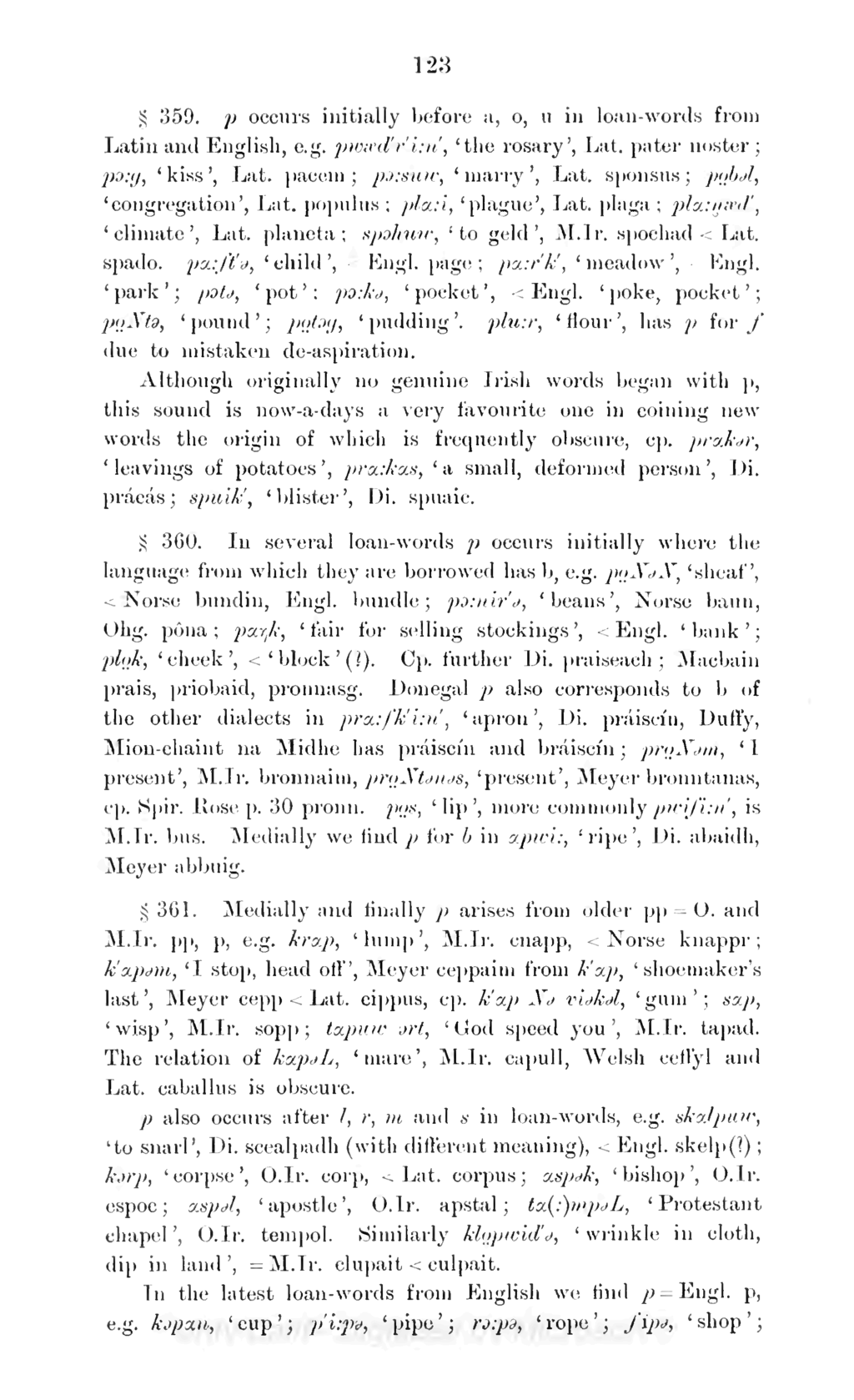123
§ 359. p occurs initially before a, o, u in loan-words from Latin and English, e.g. pwæd′r′i:n′, ‘the rosary’, Lat. pater noster; pɔ:g, ‘kiss’, Lat. pacem; pɔ:suw, ‘marry’, Lat. sponsus; po̤bəl, ‘congregation’, Lat. populus; plα:i, ‘plague’, Lat. plaga; plα:n̥æd′, ‘climate’, Lat. planeta; spɔhuw, ‘to geld’, M.Ir. spochad < Lat. spado. pα:ʃt′ə, ‘child’, < Engl. page; pα:r′k′, ‘meadow’, < Engl. ‘park’; pɔtə, ‘pot’; pɔ:kə, ‘pocket’, < Engl. ‘poke, pocket’; po̤Ntə, ‘pound’; po̤tɔg, ‘pudding’, plu:r, ‘flour’, has p for f due to mistaken de-aspiration.
Although originally no genuine Irish words began with p, this sound is now-a-days a very favourite one in coining new words the origin of which is frequently obscure, cp. prαkər, ‘leavings of potatoes’, prα:kαs, ‘a small, deformed person’, Di. prácás; spuik′, ‘blister’, Di. spuaic.
§ 360. In several loan-words p occurs initially where the language from which they are borrowed has b, e.g. po̤NəN, ‘sheaf’, < Norse bundin, Engl. bundle; pɔ:nir′ə, ‘beans’, Norse baun, Ohg. pôna; pαŋk, ‘fair for selling stockings’, < Engl. ‘bank’; plo̤k, ‘cheek’, < ‘block’ (?). Cp. further Di. praiseach; Macbain prais, priobaid, pronnasg. Donegal p also corresponds to b of the other dialects in prα:ʃk′i:n′, ‘apron’, Di. práiscín, Duffy, Mion-chaint na Midhe has práiscín and bráiscín; pro̤Nəm, ‘I present’, M.Ir. bronnaim, pro̤Ntənəs, ‘present’, Meyer bronntanas, cp. Spir. Rose p. 30 pronn. po̤s, ‘lip’, more commonly pwiʃi:n′, is M.Ir. bus. Medially we find p for b in αpwi:, ‘ripe’, Di. abaidh, Meyer abbuig.
§ 361. Medially and finally p arises from older pp = O. and M.Ir. pp, p, e.g. krαp, ‘lump’, M.Ir. cnapp, < Norse knappr; k′αpəm, ‘I stop, head off’, Meyer ceppairn from k′αp, ‘shoemaker’s last’, Meyer cepp < Lat. cippus, cp. k′αp Nə viəkəl, ‘gum’; sαp, ‘wisp’, M.Ir. sopp; tαpuw ɔrt, ‘God speed you’, M.Ir. tapad. The relation of kαpəL, ‘mare’, M.Ir. capull, Welsh ceffyl and Lat. caballus is obscure.
p also occurs after l, r, m and s in loan-words, e.g. skαlpuw, ‘to snarl’, Di. scealpadh (with different meaning), < Engl. skelp (?); kɔrp, ‘corpse’, O.Ir. corp, < Lat. corpus; αspək, ‘bishop’, O.Ir. espoc; αspəl, ‘apostle’, O.Ir. apstal; tα(:)mpəL, ‘Protestant chapel’, O.Ir. tempol. Similarly klo̤pwid′ə, ‘wrinkle in cloth, dip in land’, = M.Ir. clupait < culpait.
In the latest loan-words from English we find p = Engl. p, e.g. kɔpαn, ‘cup’; p′i:pə, ‘pipe’; rɔ:pə, ‘rope’; ʃïpə, ‘shop’;
